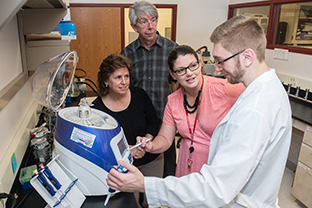October 18, 2018
SVSU receives research grant aimed at reducing Saginaw Bay Watershed contamination
 Saginaw Valley State University has received additional resources to study environmental conditions in the Saginaw Bay Watershed and improve public health for people living in and visiting communities in the watershed. SVSU faculty, staff and students are performing research aimed at identifying and reducing contamination in regional waterways.
Saginaw Valley State University has received additional resources to study environmental conditions in the Saginaw Bay Watershed and improve public health for people living in and visiting communities in the watershed. SVSU faculty, staff and students are performing research aimed at identifying and reducing contamination in regional waterways.
SVSU recently received a $200,000 grant from the Office of Great Lakes, which is a division of the Michigan Department of Natural Resources, to perform molecular source tracking in the watershed. The research involves tracing the origin of fecal contamination found in the environment to determine whether it originated from humans, cows or other sources.
“This information can potentially be used to eliminate the contamination before it even occurs, which could result in fewer beach closings and safer recreational water,” said Tami Sivy, SVSU professor of chemistry.
Sivy and other SVSU researchers have studied water quality in the Saginaw Bay Watershed for several years. She said finding the answers will involve examining DNA markers extracted from bacteria in water samples.
SVSU is home to one of only two laboratories at higher education institutions in Michigan capable of performing such research.
“The Saginaw Bay Watershed has proven to be a bit difficult to do some types of water quality analysis, so they wanted someone to do this who was committed and familiar with the region,” Sivy said.
The study began in August and is expected to extend into February 2019. SVSU faculty and students will test hundreds of water samples collected during summer 2018.
The project is a continuation of earlier SVSU-led research projects examining bacterial contamination in Michigan waterways. The previous research was supported in part by partners including the U.S. Environmental Protection Agency and the Michigan Department of Environmental Quality, and is a collaboration with health departments from Bay, Huron and Iosco counties.
